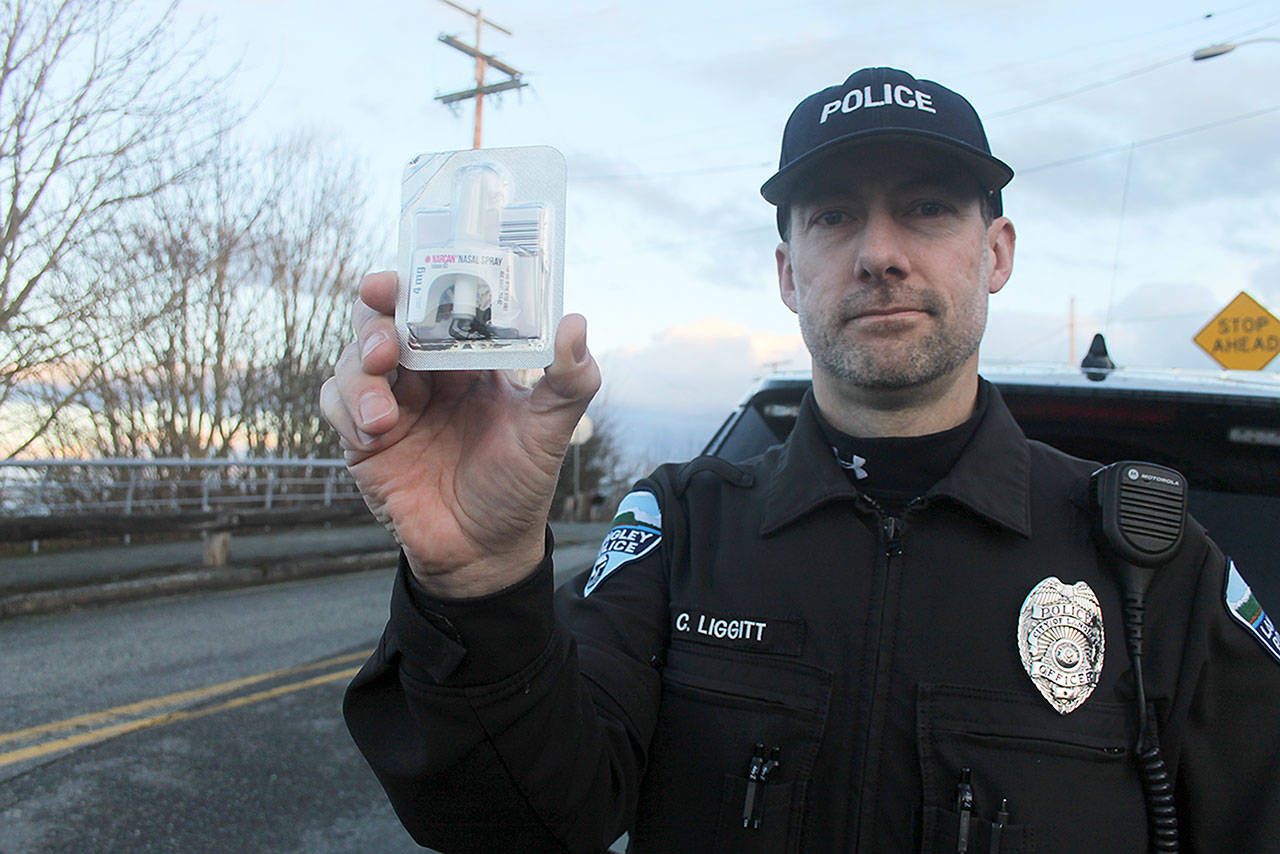Langley Police Officer Charlie Liggitt is two for two when it comes to saving lives.
This time he used the opiate overdose antidote Narcan instead of a defibrillator.
Liggitt responded to a medical call Jan. 20 at a home on Furman Avenue. He found a male, around 60 years old, face down in the kitchen. Blood was on his face, possibly from when he fell to the floor, according to the police report.
A female, who described herself as the man’s roommate, told Liggitt the unconscious man may have used heroin. He had a pulse, but was taking a breath every 30 to 40 seconds, a state known as agonal respiration.
“Some people even consider it death at that point,” Police Chief David Marks said. “It’s ineffective breathing.”
Liggitt rolled the man over with the help of a neighbor and took the nasal spray from his jacket pocket and administered the drug.
WhidbeyHealth emergency medical technicians (EMT) arrived on the scene around this time and took over treatment. Liggitt went back to interviewing the female. When he turned around to check on the man, Liggitt saw him sitting up and talking with paramedics.
They later transported him to WhidbeyHealth in Coupeville.
“It was good to see,” said Liggitt, a 10-year veteran of the department. “When I first showed up, it didn’t look good at all.”
Liggitt’s save marks the first time Narcan, also known as Naloxone, has been used by the Langley Police Department since officers began carrying it in February 2017. He was formally recognized at the Langley City Council’s Feb. 5 meeting for his efforts. Mayor Tim Callison presented him with a certificate and a Mayor’s Excellence Award pin.
It was his second honor from the city after he used an automated external defibrillator to save a Langley man who had no pulse in December 2014.
The police department and WhidbeyHealth ambulances are the only first responders on Whidbey Island carrying Narcan, which reverses the effects of an opioid overdose by blocking opiate receptors in the brain. Island County’s opioid outreach team also carries Narcan in its emergency kits.
WhidbeyHealth EMS used Narcan 43 times island-wide this past year and 34 times in 2016. Washington is among 19 states the Centers for Disease Control and Prevention identified as having significant increases in drug overdose rates from 2014 to 2015.
Police are often the first to arrive at medical calls in Langley because WhidbeyHealth paramedics are stationed in Bayview. This lag time could mean the difference between life and death, depending on the severity of the situation.
“It’s another example of how using it quickly can be considered a potentially life-saving intervention,” said Jon Gabelein, a WhidbeyHealth EMT.
Marks said Langley police have come close to using Narcan in the past, but medical personnel arrived before it was necessary. Liggitt’s action is reminder of the drug’s importance, he said.
“We’re going to keep carrying it,” Marks said. “I think it’s a great thing. It’s what we’re supposed to be doing as law enforcement. We’re supposed to be providing medical assistance and first aid.”
“I think he did a great job. We really appreciate it,” he added.
Narcan is easy to use — it works like any other regular nasal spray — and has minor side effects, including increased and decreased blood pressure, nosebleeds and confusion while the medication takes effect, Gabelein said.
Liggitt sees only positives in carrying it from his perspective as a patrol officer.
“We’re not paramedics, but we can get there and help out to a point until the professionals get there and administer their work,” Liggitt said.
Gabelein is similarly in favor of more agencies having it in their arsenal. He said “making it possible for more first responder agencies to carry Narcan could be a valuable addition to the care they provide.”
Island County Sheriff Mark Brown could not be reached for comment Wednesday or Thursday. Attempts to reach Oak Harbor Police Department officials were also unsuccessful.
As for saving another life, Liggitt was happy to have helped.
“It is part of being a first responder, being able to get there and help out somebody,” Liggitt said. “It does feel good to help others. It’s part of why you become a cop to begin with. It feels good to know you helped save a life of course.”
“I’m hoping he’s doing better,” he added.



